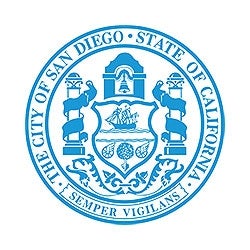The People's Business: Jan. 7, 2020

Happy New Year, San Diego! Welcome to the first installment of "The People's Business," a weekly preview of the policy matters that your City Council and its various committees will be considering. The goal here is to connect you — the residents — to your local government. Perhaps you'll come across something here that particularly interests you, and maybe you'll be inspired to hoof it down to City Hall for one of these meetings and let your voice be heard.
This is your government, after all. You're invested in it. Claim it. Be an active participant in it.
Most weeks, there will be two meetings of the full City Council, on Mondays and Tuesdays, with various policy committees meeting on Wednesdays and Thursdays. During this first week of 2020 (yikes, the future is here, folks!), there is but one meeting — a full Council meeting today, Jan. 7. Here's what's on the agenda:
Elections

Currently, candidates for Mayor and City Attorney must pay a $500 filing fee in order to run for office, and folks wanting to run for a City Council seat have to throw down $200. Those fees were set in 1985 and haven't been updated since then.
Candidates also have to demonstrate that they have a base level of support among their neighbors (who are registered to vote) by submitting a certain number of valid signatures — 200 for Mayor and City Attorney candidates, 100 for City Council. These requirements haven't been updated since 1999.
Candidates with more supporters than dollars can get their filing fee reduced by submitting signatures over and above the minimum number required. The current rate is 25 cents per signature.
Today, the Council will consider:
- Increasing the filing fee to $545 for all elective offices — Mayor, City Attorney, and City Council. This proposal is based on what's known as a Cost of Service Study, a data-driven analysis of how much it costs your government to provide various services, conducted every three years. And it doesn't cost the city any less to process nomination papers for City Council candidates than it does for Mayor or City Attorney candidates.
- Increasing the required number of valid signatures to 240 for Mayor and City Attorney candidates and 120 for City Council candidates. This is based on the fact that since 1999, there's been a 20 percent increase in the number of registered voters in the city of San Diego.
- Changing the value of valid signatures from four for a dollar to three for a dollar. This would bring city law in alignment with state law.
Learn more about running for office in San Diego.
Affordable Housing
In addition to being San Diego's legislative governing body, the City Council moonlights as the San Diego Housing Authority. In this capacity, the Council today will also consider allowing the city's Housing Commission to provide a forgivable loan of up to $3.02 million to J Street Inn, LLC, to keep all 221 units in a building located at 222 J Street, Downtown, affordable to low-income families through 2027.
 Thirteen of the units would be affordable to families earning 50 percent of the area medium income or less ($53,500 for a family of four). The remaining 208 units would be affordable to families earning 80 percent of AMI or less ($85,600 for a family of four).
Thirteen of the units would be affordable to families earning 50 percent of the area medium income or less ($53,500 for a family of four). The remaining 208 units would be affordable to families earning 80 percent of AMI or less ($85,600 for a family of four).
Also in their capacity as the Housing Authority, council members will be asked to allow the Housing Commission to apply for a $5 million CalHome grant from the California Department of Housing and Community Development. The CalHome program is aimed at helping low and very-income families purchase their own homes.
If San Diego receives the grant, it will go into the Housing Commission's First-Time Homebuyer Program, under which families earning 80 percent of AMI or less may receive a deferred payment loan of up to 17 percent of a home's purchase price, at 3 percent interest. Between July 2018 and June 2019, loans under the program averaged $63,730 — if the average loan remains the same, $5 million from CalHome would help roughly 70 struggling families.

